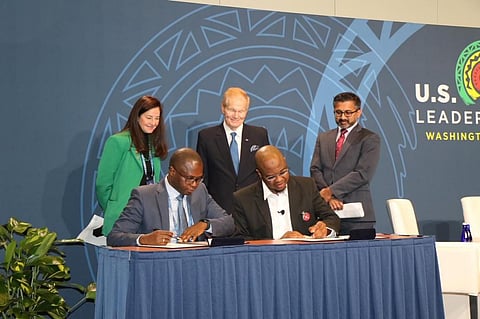

Nigeria and Rwanda became the first African signatories of the United States National Aeronautics and Space Administration (NASA)-led Artemis Accords on space collaboration, according to statement by the US White House December 13, 2022.
A total of 23 nations have signed on to the Artemis Accords that were announced by NASA and the US Department of State in 2020. They are officially described as ‘a set of principles to guide the next phase in space exploration, and promote the beneficial use of space for all of humanity’.
In 2020, NASA and the state department had announced the establishment of the Artemis Accords.
US and African space agencies came together at the US-Africa Leadership summit December 13 to advance space exploration and address issues such as climate change and global food crisis. Professor Isa Ali Ibrahim, Union minister of communications and digital economy, signed the Artemis Accords on behalf of Nigeria at the first-ever US-Africa Space Forum held alongside the summit.
On behalf of Rwanda, Francis Ngabo, chief executive of Rwanda Space Agency, signed the accords.
“As the first African nations to sign the Artemis Accords, Nigeria and Rwanda exemplify the global reach of the accords and are demonstrating their leadership in space exploration,” said NASA Administrator Bill Nelson, adding:
In an era where more nations than ever have space programmes, today’s signings highlight a growing commitment to ensure space exploration is conducted responsibly.
Commercial space cooperation engaging the private sector was also discussed between US and Africa. Several US companies have recently announced new investments in the US-Africa partnership.
Planet Labs PBC, for instance, is providing satellite data insights to regional reinsurance company, ZEP-RE, Kenya, for its work with the World Bank on drought risk protection in the Horn of Africa. ZEP-RE aims to support over 250,000 pastoralists by expanding its insurance programme.
The World Bank-supported drought risk protection programme known as ‘DRIVE’ is in collaboration with governments of Djibouti, Ethiopia, Kenya and Somalia.
Nigeria currently has a target to bring at least 70 per cent of the population under broadband coverage by 2025, according to the National Broadband Plan (2020-2025).
Starlink, the high-speed, low-latency broadband service of the Space Exploration Technologies Corp (SpaceX), is not available in Nigeria (first in Africa) and is expected to contribute towards Nigeria’s goal of broadband coverage. SpaceX, is an American spacecraft manufacturer, launcher and a satellite communications corporation with headquarters in California.
Zipline, another American company, is using space data to expand its aerial logistics services to more government sectors in Rwanda.
This includes health, agriculture, finance, e-commerce and tourism divisions. It has set itself a target of conducting nearly two million instant deliveries across Rwanda by 2029.